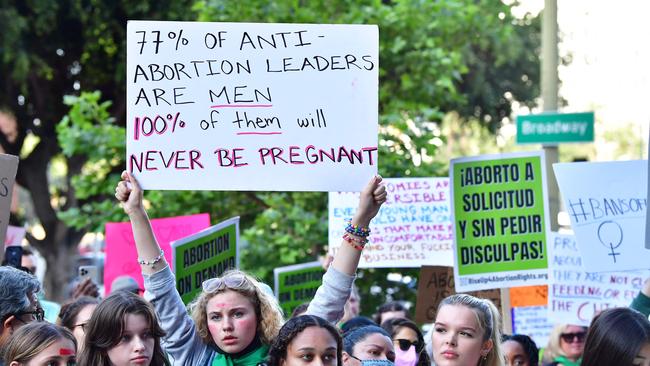With Roe v Wade set to be overturned in the US, what are SA’s abortion laws?
The US is poised to dramatically remove a 50-year-old constitutional right protecting abortion. Could SA see something similar? Local experts weigh in.
SA News
Don't miss out on the headlines from SA News. Followed categories will be added to My News.
The United States is in political turmoil amid leaked revelations that a half-a-century old law protecting a woman’s rights to terminate a pregnancy is set to be overturned.
The draft, written by conservative Justice Samuel Alito, would overrule the landmark 1973 Supreme Court decision in Roe vs. Wade, which has underpinned abortion rights in the US for the last 50 years.
The constitutional decision means that US state governments can only ban abortions from the point of “visibility” – about 23 or 24 weeks of pregnancy.
Overturning the rulings would mean abortion could be banned far earlier. For many women, before they would even know they were pregnant.
The leaked document has sparked fury across the nation, with pro-choice Americans – and President Joe Biden – labelling it “way overboard” and “radical”. Many US women fear they could lose their right to choose.
But with uproar reigning in America, the question is: could the same thing happen in South Australia?
In March last year, South Australia became the last state in the country to decriminalise abortion following rigorous debate.

Decriminalisation, as opposed to legalisation, refers to a reduction in penalties or requirements, rather than making the act itself legal.
The Termination of Pregnancy Bill removed abortion from the criminal code and placed it under a health model. It also allowed for terminations after 22 weeks and six days’ gestation.
Women seeking an abortion after that period must seek the approval of two doctors on psychological, physical or social grounds, such as domestic violence or financial circumstances.
Medical practitioners can still refuse to perform or assist with an abortion if it legitimately conflicts with their personal beliefs – but they must provide information to the patient on how to locate or contact a medical practitioner who does not have a conscientious objection.
A doctor also cannot perform an abortion for the purposes of sex selection.
According to advocates, the Bill’s success was a significant win in overturning “outdated” laws and improving access, particularly for patients in rural and remote South Australia.
Could it happen here?
The Roe v Wade decision in the United States created a constitutional right to abortion which underpinned state laws. There is no such provision in the Australian constitution that expressly limits or authorises access to a termination.
President of the Law Society Justin Stewart-Rattray told The Advertiser that this meant abortion laws in Australia were entirely within the purview of states and territories.
However, there could still be ways the federal government could affect practical access to abortion.
“Hypothetically, the Commonwealth could influence access to medical procedures such as abortion through fiscal means, for example by restricting Medicare funding for doctors who perform abortion procedures,” Mr Stewart-Rattray said.

Realistically, with no signs of federal intervention, Mr Stewart-Rattray said the only way that abortion rights could be wound back was if the state enacted new laws to replace the decriminalisation bill.
The 2021 reform went to a conscience vote in the Lower House and passed with 29 in favour and 15 against.
While this suggests some contention within parliament, most of the concerns from objectors centred around late-term abortion.
In theory, if state parliament was comprised by a majority of members intent on winding back abortion laws, then there would be no constitutional backing like Roe v Wade to prevent it.
However, Mr Stewart-Rattray said this was highly unlikely.
“We should be comforted that the current law reflects the attitudes of contemporary society and the chances of these laws regressing are extremely remote,” he said.





